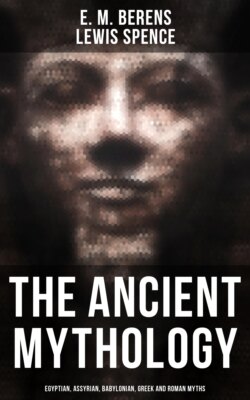Читать книгу The Ancient Mythology: Egyptian, Assyrian, Babylonian, Greek and Roman Myths - Lewis Spence - Страница 84
На сайте Литреса книга снята с продажи.
The Bull of Anu
ОглавлениеTo resume the tale: In her wrath and humiliation Ishtar appealed to her father and mother, Anu and Anatu, and begged the former to create a mighty bull and send it against Gilgamesh. Anu at first demurred, declaring that if he did so it would result in seven years' sterility on the earth; but finally he consented, and a great bull, Alu, was sent to do battle with Gilgamesh. The portion of the text which deals with the combat is much mutilated, but it appears that the conflict was hot and sustained, the celestial animal finally succumbing to a sword-thrust from Gilgamesh. Ishtar looks on in impotent anger. "Then Ishtar went up on to the wall of strong-walled Erech; she mounted to the top and she uttered a curse, (saying), 'Cursed be Gilgamesh, who has provoked me to anger, and has slain the bull from heaven.'" Then Eabani incurs the anger of the deity—"When Eabani heard these words of Ishtar, he tore out the entrails of the bull, and he cast them before her, saying, 'As for thee, I will conquer thee, and I will do to thee even as I have done to him.'" Ishtar was beside herself with rage. Gilgamesh and his companion dedicated the great horns of the bull to the sun-god, and having washed their hands in the river Euphrates, returned once more to Erech. As the triumphal procession passed through the city the people came out of their houses to do honour to the heroes. The remainder of the tablet is concerned with a great banquet given by Gilgamesh to celebrate his victory over the bull Alu, and with further visions of Eabani.
The VIIth and VIIIth tablets are extremely fragmentary, and so much of the text as is preserved is open to various readings. It is possible that to the VIIth tablet belongs a description of the underworld given to Eabani in a dream by the temple-maiden Ukhut, whom he had cursed in a previous tablet, and who had since died. The description answers to that given in another ancient text—the myth of Ishtar's descent into Hades—and evidently embodies the popular belief concerning the underworld. "Come, descend with me to the house of darkness, the abode of Irkalla, to the house whence the enterer goes not forth, to the path whose way has no return, to the house whose dwellers are deprived of light, where dust is their nourishment and earth their good. They are clothed, like the birds, in a garment of feathers; they see not the light, they dwell in darkness."
